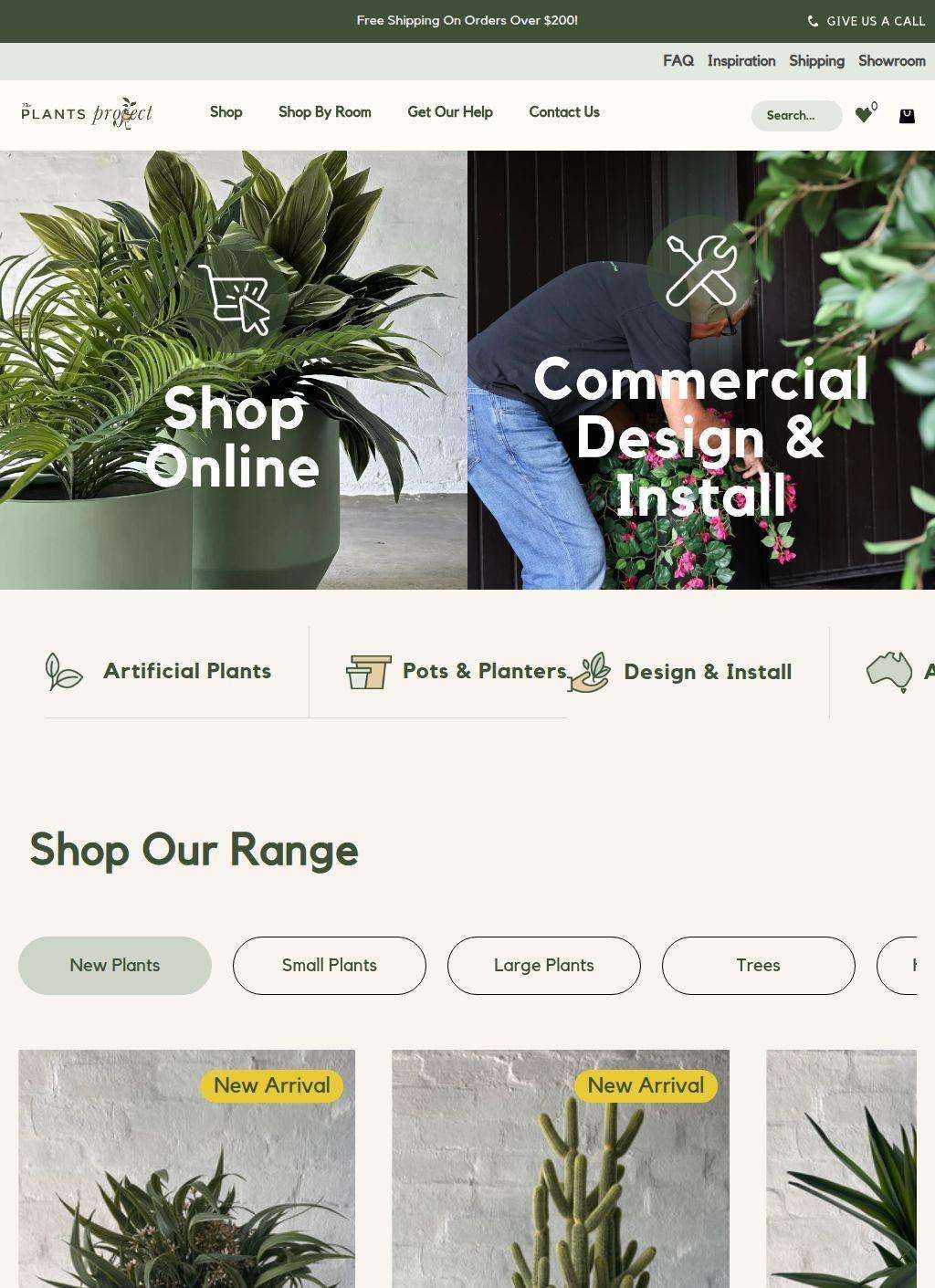The Plants Project operates as an online retailer specializing in artificial plants, trees, and decorative planters throughout Australia. The company positions itself within the home décor and interior design market, offering curated collections of lifelike faux botanicals designed to bring greenery into residential and commercial spaces without maintenance requirements. Based in Australia with nationwide shipping capabilities, the business caters to customers seeking aesthetic plant solutions for homes, offices, and commercial environments.
The product catalog encompasses multiple categories of artificial botanicals designed to replicate various plant species and styles. Indoor artificial plants form the core offering, featuring popular varieties like Monsteras, Fiddle Leaf Figs, Ficus trees, and tropical palms. Outdoor artificial plants provide weather-resistant options for balconies, terraces, and entrance areas. The range extends to specialized products including hanging plants, vines, artificial trees of varying heights, and an Australian native plant collection that celebrates local flora.
Complementing the artificial plant selection, The Plants Project offers an extensive range of pots and planters to complete the decorative ensemble. Wall planters and half-moon hanging options provide vertical greening solutions for space-conscious environments. Traditional floor pots come in various sizes and finishes, from modern minimalist designs to classic terracotta-style containers. The company markets these accessories as integral components of their design philosophy, recognizing that proper presentation enhances the realistic appearance of artificial plants.
Customer service distinguishes The Plants Project through personalized design assistance and visualization services. Customers can email photos of their empty spaces to receive mock-up images showing how different plant and planter combinations would appear in their specific environment. This service, typically delivered within 24 hours, helps buyers make confident purchasing decisions without physically viewing products. The team provides sizing recommendations, styling advice, and project consultation for both residential and commercial applications.
Quality standards at The Plants Project emphasize realism and durability in their artificial plant offerings. The company specifically distances itself from older-generation plastic plants, instead stocking products designed to closely mimic natural foliage through detailed textures, color variations, and realistic branch structures. Customer reviews frequently mention the lifelike appearance of products, with some noting that visitors mistake the artificial plants for real ones even upon close inspection.
The business model operates entirely online without traditional brick-and-mortar showrooms, though warehouse visits can be arranged by appointment for customers wanting to view products in person. This e-commerce focus allows the company to maintain competitive pricing while offering nationwide delivery services. Fast shipping represents a key service feature, with multiple customer reviews praising next-day delivery in certain areas and efficient order fulfillment across Australia.
Pricing structures vary significantly across the product range, accommodating different budget levels and project scales. Entry-level items like artificial English Ivy start at promotional prices around $14, while premium pieces such as large artificial Ficus trees can reach $649. The company offers payment flexibility through services like Afterpay, allowing customers to spread costs over multiple installments for higher-value purchases. Regular sales and promotions provide additional savings opportunities on selected items.
The target market spans multiple customer segments with distinct artificial plant needs. Homeowners seeking low-maintenance décor solutions form a primary demographic, particularly those with busy lifestyles, frequent travel, or challenging growing conditions. Commercial clients include offices, retail spaces, hospitality venues, and professional fit-out projects requiring consistent aesthetic appeal without ongoing plant care. Allergy sufferers and pet owners represent another key segment, attracted to pollen-free alternatives that eliminate concerns about plant toxicity.
Customer feedback across various platforms reflects high satisfaction levels with both product quality and service delivery. Trustindex shows a 4.9-star rating from 38 customers, while the company's own review page features numerous testimonials praising plant realism, packaging quality, and customer support responsiveness. Common themes in positive reviews include surprise at the lifelike appearance, appreciation for the mock-up service, and satisfaction with long-term durability compared to maintaining real plants.
The company's approach to sustainability presents an interesting paradox within the artificial plant industry. While promoting plastic-based products might seem environmentally questionable, The Plants Project frames their offerings as sustainable alternatives to repeatedly purchasing and replacing living plants that fail to thrive. The emphasis on quality and durability suggests a buy-once philosophy aimed at reducing waste from failed gardening attempts and frequent plant replacements.
Room-specific collections demonstrate strategic product curation for different living spaces. The bedroom collection features calming, low-profile plants suitable for restful environments. Kitchen and bathroom collections include moisture-resistant options that thrive visually in humid conditions where real plants might struggle. Office collections focus on desk-friendly sizes and professional aesthetics. This targeted approach helps customers navigate the extensive catalog based on intended placement rather than just plant species.
Installation simplicity represents a key selling point across all product categories. Artificial plants arrive ready to display, requiring only unpacking and basic shaping to achieve desired appearance. Hanging plants come with mounting hardware, while potted options often include pre-styled arrangements. This turnkey approach appeals to customers lacking gardening skills or time for plant establishment, offering instant gratification in home decoration.
The competitive landscape includes major retailers like Bunnings offering budget artificial plants, specialized competitors like Artificial Plant Shop and The Plant Factory providing similar premium options, and traditional nurseries expanding into artificial alternatives. The Plants Project differentiates through personalized service, design consultation, and careful product curation rather than competing solely on price or selection volume. Their position in the mid-to-premium market segment targets quality-conscious consumers willing to invest in realistic artificial botanicals.
Business operations appear streamlined for online efficiency, with investment in customer service tools like visualization technology and responsive communication channels. The absence of physical retail locations reduces overhead while allowing focus on product quality and customer experience. Warehouse facilities enable inventory management and order fulfillment, while the appointment-based viewing option provides flexibility for customers requiring physical product inspection before major purchases.
